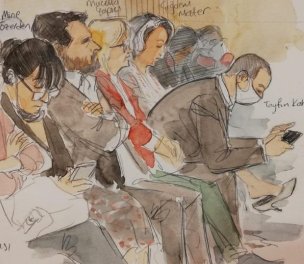* Drawing: Murat Başol
Click to read the article in Turkish
Behind bars for 1,634 days, Osman Kavala made his statement as to the accusations at the sixth hearing of the Gezi retrial today (April 22). We publish the full English translation of his statement.
***
I was convinced that it was meaningless for me to raise a defense due to the fact that the President and some politicians continued to make accusatory statements about me and that my detention continued on unconvincing grounds despite the fact that we have shown that the allegations that have been brought against me for nearly four and a half years were baseless, that I was acquitted in the Gezi Trial, and that the ECtHR found violation as regards to my detention. As I noticed the emergence of the will to adjudicate this case in this hearing, I consider it necessary to stress certain facts once again and for the last time, even though I do not expect them to have any impact on the judgment.
28 months ago, the ECtHR ruled that political factors played a role in my detention, rather than legal reasons. The developments after this judgment, namely the release, the acquittal, the re-arrest on the same day on a charge on which I had previously been released, the re-release, the arrest on another charge, the separation of case files, the consolidation and re-separation of case files, the arbitrary enforcement of laws for these purposes, and the accusatory statements of the President and other politicians during the judiciary process, turned this trial into a judicial case that has become completely deformed under political influence, and my prolonged detention into an act of deprivation of liberty by abuse of power.
In November 2017, I was arrested on two allegations, namely orchestrating and organizing the Gezi Park Events and participating in the attempted coup of July 15. There was an apparent desire to associate these two incidents with me. Since no evidence was found for such an association in the two years after my arrest, while I was waiting for an indictment to be issued, the allegations and case files were separated, and the Gezi Indictment was issued based on the fictional scenario built by a group of law enforcement officers, who would later be tried for being members of FETO, on certain articles in the media, using the data obtained by the same group through illegal wiretapping activities. The Gezi Trial resulted in acquittals as the so-called evidence was collected unlawfully and did not indicate any illegal activity, as stated in the ECtHR's judgment. Apparently, the President's reaction to this decision was negative, because an effort was made to prolong my detention by issuing detention orders against me, first on the allegation of participating in the attempted coup, on which I was ex-officio released, then on the charge of espionage, which was fabricated unlawfully based on the same so-called evidence. As a result, I was re-arrested. A strange indictment filled with conspiracy theories and misleading statements on both allegations was issued.
According to this indictment, I have provoked minorities against the state under the guise of culture and art activities for many years, and obtained critical information on the social and cultural characteristics of the society for the purpose of espionage through these activities. Furthermore, I actively participated the attempted coup of July 15 and had contact with those who unlawfully wiretapped my phone and constructed the Gezi Uprising scenario. I also travelled abroad to coordinate those who would take part in the new government to be formed after the coup. I worked in close cooperation with Henri Barkey in all these activities, but since the activities were carried out very professionally, there was no evidence to prove this cooperation. Yet, important facts, such as the fact that I was in France when Henri Barkey travelled to Adana on 10 March 2016, were established.
It is evident that those who issued the indictment did not feel constrained by laws, considering that they will receive political support as they intended to prolong my detention at all costs. They invented a new type of crime to be used for any arbitrary practice, by expanding the scope of the crime of espionage, which is known as the act of obtaining military and political information and other information on the functioning and characteristics of public institutions, to include any research activity on the social and cultural characteristics of the society. In my previous defenses, I stated that the charge of espionage, which was fabricated without complying with the definitions in the law in order to prolong my detention, brought to mind the use of penal laws by separating them from their content and raison d'être in Nazi Germany.
As it is understood, it was decided to adjudicate the case quickly after the judgment of the decision of the Committee of Ministers of the Council of Europe to refer the case to the ECtHR to examine the practices aiming to prolong my detention. The cases, which were consolidated without any evidence or reason, were separated. As can be seen in the opinion letter, the second indictment, which was filled with charges fabricated to prolong my detention and absurd allegations, has expired as it is no longer needed.
The second indictment was issued only to prolong my detention. The Gezi Indictment also targets me, but it also has a more important function: An attempt is being made to criminalize the Gezi Park Events and to discredit the will of hundreds of thousands of citizens who participated in the events, using the fictional scenario featuring George Soros and me.
The investigation record annexed to the indictment makes it evident that the fictional scenario that the Gezi Park Events were designed by Soros and foreign powers as an insurrection attempting to overthrow the government and were staged after two years of preparation, and that I organized these events was constructed by the high-ranking officials in the Department of Anti-Smuggling and Organized Crime who were later tried for being members of FETO. The secret organization alleged to have organized the Gezi Park Events as an insurrection and to operate under my leadership in the indictment is quite similar to the secret organization in the Ergenekon indictment, the members of which had no relationship with one another but were allegedly engaged in joint activities to overthrow the government. The Ergenekon and Sledgehammer Trials aimed to eliminate individuals using judicial processes. Those who organized these processes convinced others that they were protecting members of the government and politicians against conspiracies. Thanks to the political support they secured by this means, they enjoyed the privilege of violating the rules of law. It is evident that the fictional scenario constructed by the Department of Anti-Smuggling and Organized Crime regarding the Gezi Park Events serves the same purpose. However, as social media posts, meetings, demonstrations, and press statements before and during the Gezi Park Events were visible to the public, this conspiracy theory was not found convincing at the time, and the government did not feel the need to offer this fictional scenario.
The most significant indicator that this theory was not popular at the time is that the Prime Minister met with activists and spokespersons of the groups who participated in the events, on 12 and 14 June 2013. In case the Gezi Park Events were the result of two years of preparation through social media posts and provocative theatre plays, as alleged, the intelligence agency would have known about it, and the Prime Minister probably would not have met with those who served the plan to overthrow him. The meetings of politicians from the government circle with George Soros, who allegedly planned and financed the insurgence, continued after the Gezi Park Events. We know that Soros met with the authorities when he visited Turkey in November 2015.
The narrative that the Gezi Park Events were an insurgence staged by foreign powers became the official view of the government after the attempted coup of July 15, not because new pieces of evidence or information emerged, but because this fiction was suitable to the political environment of the new era and the political discourse built on the attacks of foreign powers, and served the purpose of criminalizing the Gezi Park Events. Today, certain protests and demonstrations are associated with the pro-coup mindset based on the example of Gezi Park Events. The Gezi Indictment was issued based on this fiction. The Indictment and my detention were used to support the same fiction.
It is significant that the fictional scenario constructed by the Gülenist organization and the data obtained by the same group through illegal wiretapping activities were used after the elimination of the members of the judiciary who were accused of being members of FETO. Once the methods of forgery and abuse of laws for political purposes in the Sledgehammer and Ergenekon Trials were uncovered, the judiciary would be expected to draw the necessary lessons from it and become much more careful than before about ensuring compliance with legal norms. On the contrary, abuse served as a precedent, and the use of the judiciary as a tool for political purposes and the methods of perverting the course of justice continued much more strongly.
The letter of opinion in front of you is faithful to the fiction in the Gezi Indictment. Events that are not consistent with the narrative that the Gezi Park Protests were an insurgence suppressed by law enforcement were not included in the letter of opinion. Therefore, the meetings with the Prime Minister and the announcement made by Taksim Solidarity Platform after the meeting on 14 June that the protests would continue only in Taksim Solidarity's tent and that other tents, banners, and flags would be removed were not included. The Indictment does not mention the fact that banners, flags, and barricades were removed after this announcement. These details are available in the Gezi Park Events Report, which was released by the Human Rights and Equality Institution of Turkey, a government agency, on 30 October 2014 and used in the Opinion Letter submitted by the Government to the ECtHR on 7 March 2019 regarding my detention. The Report described the actions of law enforcement that caused deaths and injuries, and the excessive and irregular use of tear gas in detail:
The report stated that "Many public images showed that the police continued to use force against protesters who fled, took shelter in businesses, or became ill due to the tear gas fired, and that many peaceful protesters and even those who were not involved in the protests were injured due to the irregular use of instruments of force, especially tear gas.
In this context, responses that do not comply with the principle that the force used against civil disturbances should progressively and proportionately increase depending on the degree of force, violence, resistance, or attack can be considered a violation of Article 3 of the European Convention on Human Rights, which 'prohibits torture and ill-treatment.'
The intense exposure of the crowd to tear gas and other instruments of force during the Gezi Park Events led to anger towards law enforcement officers, which triggered violence and caused the protests to be continuous."
The opinion letter refers to the deaths during the Gezi Park Events in a single sentence: "Many citizens lost their lives." Many citizens were injured during the Gezi Park Events, the citizens who lost their lives were not many, but only a few. The fact that it was not considered necessary to specify who these citizens were and how they lost their lives leads the deaths to become ordinary and makes them almost an extension of the damage to property.
The bitter truth that Ethem Sarısülük was shot to death by a police officer during the protest, that Abdullah Cömert and Berkin Elvan were killed by tear-gas canisters that hit their heads; Zeynep Eryaşar, Selim Önder, Serdar Kalakal, and İrfan Tuna were killed as a result of intense exposure to tear gas; and that Ali İsmail Korkmaz was killed as a result of a physical attack involving police officers was not included in the letter of opinion.
A narrative of the Gezi Park events that ignores the disproportionate and unlawful use of tear gas by the security forces, and the deaths and severe injuries caused by it, in order not to undermine the uprising theory, reflects an understanding that does not value human rights or the lives of those who are considered undesirable, just as the judicial actions that have deprived me of my right to live freely for the last four and a half years.
Many national and international academic studies have been conducted on the Gezi Park Events. We have reviewed and submitted to the Court nearly 35 articles published in major journals or included in collections published by reputable publishing houses. The main observation included in the articles was that the Gezi Park Events were unplanned and unexpected. In terms of the type of organization, all the studies underline that the events were "horizontal," "decentralized," and "leaderless."
In conclusion, none of the scientific studies or evaluations that have been conducted to date puts forward any theory that the Gezi Park Events were planned to overthrow the Government and carried out with the support of foreign powers.
According to the Ministry of the Interior, more than 3 million people participated in 5500 events/activities, 164 of which were met with police response as they had become unlawful, in 80 cities. Thus, the theory that this was a centrally-organized uprising is an allegation that serves political purposes and is devoid of any legal or logical basis. It is also an absurd allegation that I planned, organized, and orchestrated these events; that I met the material needs of the uprising by bringing a table, a speaker, buns, and pharmacy-bought respirators to the Gezi Park; and that I managed the Taksim Solidarity Platform, which consists of nearly 70 organizations, including political parties, by making a few phone calls with two people.
Since the Indictment does not include any evidence proving that I was the leader of an organization or that I was aware of a planned uprising, and these allegations are extremely unrealistic and illogical, new definitions were included in the opinion letter to bring charges against me.
It is alleged that I mentored the protesters. As someone who has served in non-governmental organizations for 30 years and who defends peace, human rights, and democracy, I share my views with the public and the civil society activists and politicians that I know. In this context, I also had a meeting with the government officials, as stated in the Indictment. It is not a matter of discussion that I recommend violent and criminal acts and encourage people and organizations to engage in such acts. The Indictment does not include any evidence to support this allegation, either. None of the statements attributed to me as a result of unlawful wiretapping activities and included in the Indictment reflect such an intention.
The definition "behind-the-scenes organizer" is also used since the Indictment does not include any evidence that associates me with the crime or indicates that I supported an organization that operates for such purposes. I openly opposed the construction project in the Gezi Park, made an effort to stop this project, made public statements on this topic, and attended the meetings held for this purpose. Since my office is adjacent to the Gezi Park, I had the chance to visit the park on various occasions and observe those young people, most of whom were not affiliated with any organization. I appreciated their peaceful and ethical guard duty and sensitivity about protecting the Gezi Park, and brought a table and a speaker to the park for them to use. I participated in the tree-planting events in the Gezi Park in person. I never needed to hide any of my activities behind the curtains. None of my actions or statements include any sign or expression that I was implementing a secret plan.
As I stated in my defense, I consider peaceful protests aiming to prevent government initiatives that are not in public interest as legitimate civil society activities and a requirement of democracy. The Gezi Park is not an empty lot with a few trees that can be moved. It is a precious place that fulfills an important public function, contributes to the social infrastructure of the city, and serves thousands of Istanbulites like me, who reside or work in the region. The construction project, which would lead to the destruction of the Gezi Park, was imposed in anti-democratic manner and jeopardized public interests. It was in the public interest to prevent the destruction of the park through a project presented as a fait accompli, and to ensure that the Administrative Court cancelled the project and stopped the construction, just as how the protests organized against the legal regulations to be introduced by the government to allow occupation forces to cross our territory and use our ports in order to facilitate the invasion of Iraq prevented the introduction of the regulations.
The allegation that the Gezi Park Events were financed by George Soros is a malicious fictional scenario aiming to discredit the actions of those who participated in the protests. Not only citizens who participated in the protests, but also MASAK officials and the inspectors who have examined the account activities of the Open Society Foundation and Anadolu Kültür know very well that this allegation is not true. The Gezi Indictment clearly states that this allegation is not based on any result or evidence obtained as a result of an investigation, but on the belief that Soros was the foreign power behind the Arab Spring.
At the beginning of the Indictment, it was stated that the media reported that "George Soros was a critical actor in the uprisings and provided great financial support for the revolutions" "during the movements that took place in several countries such as Egypt, Tunisia, and Yemen." The Indictment states that "as these processes and the Gezi uprising fully overlap" and "the same slogans and images were used on social media," "it was found that George Soros played an active role in the Gezi uprising, as he did in other countries where uprisings took place."
In my defense, I stated that these allegations, which were used to support the allegation that Soros financed the Gezi Park Events, were neither true nor logical, and that the social movements in Egypt and Tunisia were launched under the leadership of the Muslim Brotherhood and similar organizations.
The events described in the Indictment are not consistent with the fictional scenario, either. My attempts to start a TV/web channel were presented as evidence that I had organized the Gezi Park Events. According to the Indictment, the purpose of these channels would be to ensure that the Gezi uprising remains a hot topic, and bring up new uprisings. It was alleged that I contacted several individuals and organizations to secure funds for this attempt, and intended to contact Soros, as well. I wonder why the broadcasting project, which had such an important role in the uprising, had not yet been financed by Soros, who had allegedly been planning and financing the uprising for the last two years. We can ask the same question for the Gezi movie project, which was not implemented but was used as evidence against me, and for the allegation that I was seeking funds to provide masks and equipment to protestors.
As I stated before, I have never held any other position or had any other authority than other board members at the Open Society Foundation, which has complied with laws since its establishment. I had no special contact with George Soros other than the meetings held with all board members to evaluate the activities of the Foundation during his visits to Turkey.
The fact that no other Board Member of the Open Society Foundation was summoned to testify and that George Soros has not been charged with any crime indicates that even those who constructed the scenario that Soros organized and financed the Gezi Park Events through me did not believe in this scenario.
I would like to remind you that I have not been interrogated by the Public Prosecutor's Office at any stage of the proceedings. The fact that someone believed to have played such an important role in the Gezi Park Events, which were allegedly planned and staged to overthrow the government, and in the attempted coup of July 15 has not been interrogated to obtain information about his activities and collaborators is against the nature of the prosecution profession and is a serious neglect of duty. However, if the fictional scenario to be used in the Indictment has already been constructed, it would be understandable that the prosecution preferred not to conduct any interrogation. It is because the information to be obtained during the interrogation could complicate the fictional scenario.
The opinion letter indicates that the purpose of the Open Society Institute and its members was to corrupt different cultures around the world and create communities with a universal culture under their control; that as a result, they would be able to create a universal consumer society that would maintain the capitalist system, which is under their control, in line with their interests; and that they used the non-governmental organizations they funded, for these purposes.
This evaluation was not supported by any study, and no reputable academic and scientific study was cited. Therefore, it does not qualify as an explanation that can be used in legal texts, but it reflects the beliefs of the author. The view that a very small community controls the global capitalist system, spreads the universal culture, corrupts different cultures, and thereby dominates the world brings to mind the theories of certain circles that the Jewish people, who have a cosmopolitan culture, implement a secret plan to dominate the world. The adaptation of this ideological perception to the Gezi Park Events serves the falsification of the facts and the objective assessment of the events. Would a park where people of all ages and classes, including young people, students, street vendors, shoeshiners, poor janitors and their families, and Syrian migrants, can visit, rest, and chat without being humiliated or disturbed, or a shopping mall where poor people cannot enter and where local and international brands are marketed cause people to feel the urge to consume?
Would struggling to preserve a public park or imposing commercial projects that would destroy it create a consumer society and lead to capitalist dominance over people?
The opinion letter does not include an honest and objective assessment of concrete facts made in accordance with legal norms, but a repetition of the Gezi Park Events scenario, which reflects the discourse of political actors and has been fortified with additional ideological observations.
This fictional scenario could be useful to pervert the course of justice for a while. However, I believe that this perversion will not last long, and the public will not be convinced that this fictional scenario is true and that those who are present here are guilty.
After losing four and a half years of my life, the only aspect I can find solace in is the possibility that the process I experienced could contribute to confronting the crucial problems in the judiciary of Turkey, thus, those who will be brought to justice in the future could receive a fairer treatment. (HA/SD)




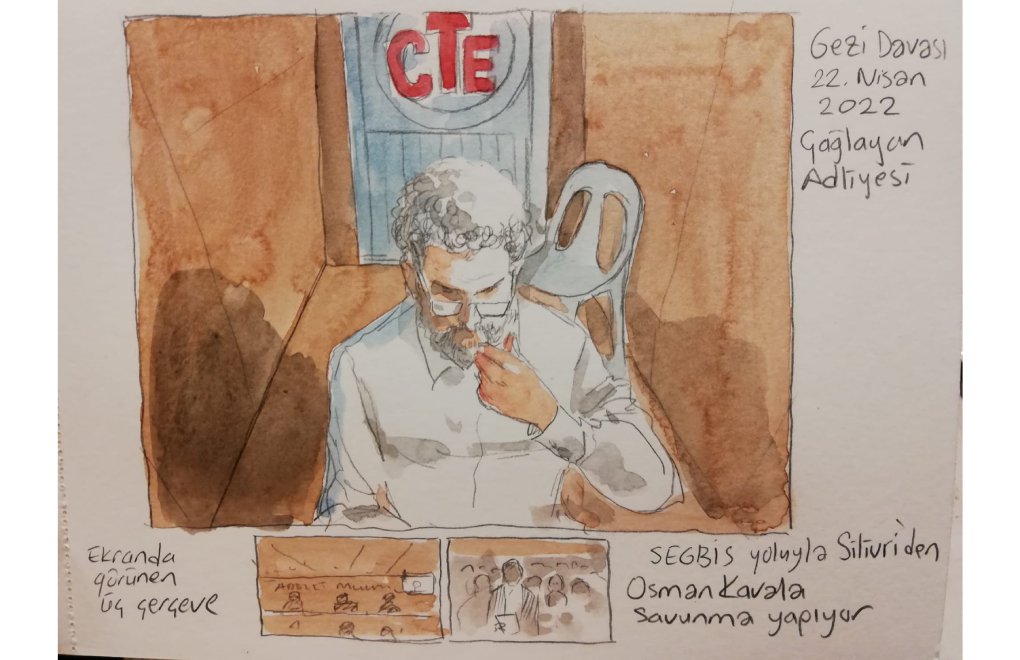
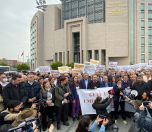
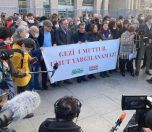
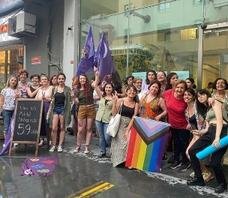
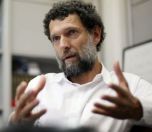

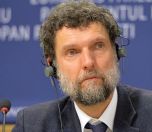
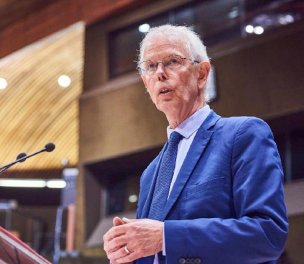
slcdaskl.jpg)
sa.jpg)
sa.jpg)
